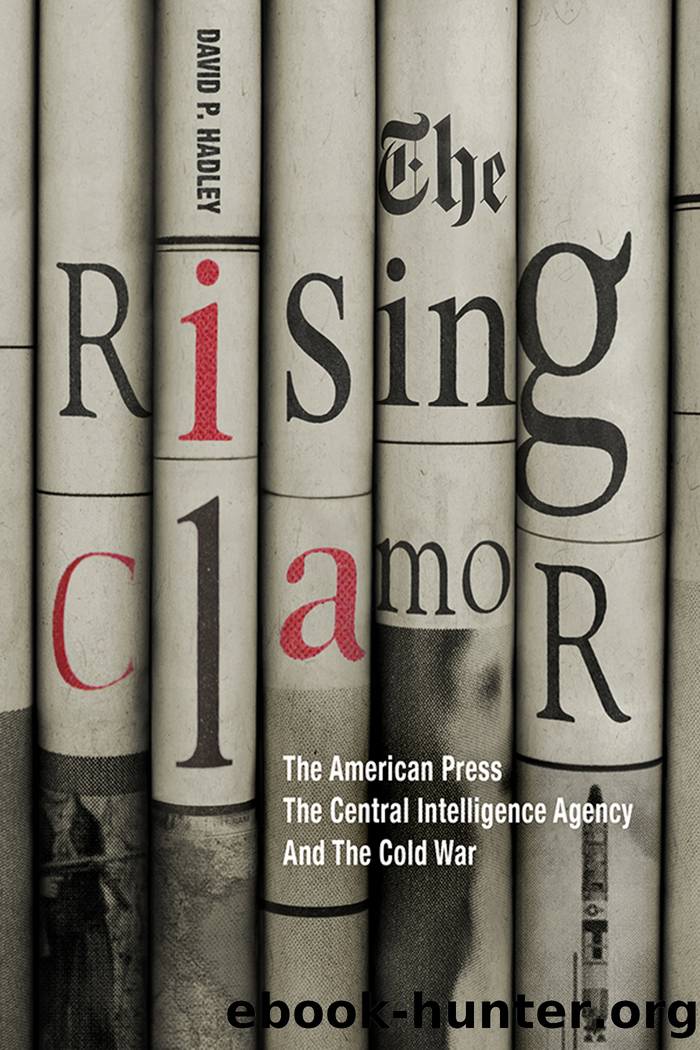The Rising Clamor: The American Press, the Central Intelligence Agency, and the Cold War by David P. Hadley

Author:David P. Hadley [Hadley, David P.]
Language: eng
Format: epub
Tags: Media Studies, Social Science, Political Science, History, Security (National & International)
ISBN: 9780813177397
Google: TKuWDwAAQBAJ
Goodreads: 42816958
Publisher: University Press of Kentucky
Published: 2019-06-14T00:00:00+00:00
6
The Year of Intelligence Begins
In late March 1975 the weekend edition of the Washington Post included an outline for a new board game called Spook. The game lampooned the world of intelligence, and its board was decorated with CIA-related caricatures. At the top of the game board were cartoon portraits of past directors of Central Intelligence. Game spaces were locations with great significance to CIA history: Greece, Iran, Chile, Cambodia, and Vietnam. Throughout the board, players navigated such challenges as âexposure,â which involved rolling a die to determine outcomes such as âyour agent is a moleâterminate yourself with extreme prejudice.â At the end, if players successfully maneuvered through all the challenges of the game, they were congratulated for reaching retirement âwith your thumbs intactâ and received the good news that the literary agent Scott Meredith âhas gotten you a $100,000 advance on your memoirs!â1
Spook focused on what, by 1975, were well-known examples of CIA foreign intervention. On the game board, CIA interventions were not only acknowledged but mocked. Spook reflected the increasing demystification of the CIA in the American press. Rather than a disciplined, professional, and effective force, the agency was portrayed as dangerous, but also ridiculous.
The CIA was open to such criticism and mockery because of its already fragile position, which worsened following Hershâs 1974 revelation of the CIAâs domestic surveillance program. The subsequent period, 1975 and much of 1976, would be consumed by the very public investigation of the CIA in what would come to be called âthe Year of Intelligence.â In January a blue-ribbon presidential committee headed by Vice President Nelson Rockefeller investigated charges that the CIA had overstepped its mandate. Soon the Senate and House both formed their own committees to investigate the CIA; they planned to examine not just the immediate charges against the CIA leveled by Seymour Hersh, but the longer history of the CIAâs activities in the Cold War.2 Throughout the investigations, the press was an important observer of, interpreter of, and forum for a fierce debate about the future of the CIA. A prominent theme that emerged in CIA criticism was that the agency was dangerous but also ineffective for its intended purpose. Alarm at the CIAâs activities was often matched with incredulity about what those activities actually were.
This chapter does not attempt to provide a complete account of the Year of Intelligence.3 The âyear,â which in reality stretched across roughly eighteen months, was filled with revelations, negotiations, and bureaucratic maneuvers between and within Congress, Gerald Fordâs White House, the CIA, the FBI, and others. This chapter instead examines the way in which the press set the terms of debate for the Year of Intelligence, and the effects that the investigations of the CIA had on the press and its relationships with that agency.
The press was by no means unified in its approach to the CIA. Longtime CIA critics seized the opportunity to criticize the agency. Some charged that the CIA was an existential threat to democracy. Some lampooned the agency. Others
Download
This site does not store any files on its server. We only index and link to content provided by other sites. Please contact the content providers to delete copyright contents if any and email us, we'll remove relevant links or contents immediately.
The Secret History by Donna Tartt(19090)
The Social Justice Warrior Handbook by Lisa De Pasquale(12190)
Thirteen Reasons Why by Jay Asher(8910)
This Is How You Lose Her by Junot Diaz(6887)
Weapons of Math Destruction by Cathy O'Neil(6281)
Zero to One by Peter Thiel(5802)
Beartown by Fredrik Backman(5755)
The Myth of the Strong Leader by Archie Brown(5508)
The Fire Next Time by James Baldwin(5446)
How Democracies Die by Steven Levitsky & Daniel Ziblatt(5219)
Promise Me, Dad by Joe Biden(5153)
Stone's Rules by Roger Stone(5088)
A Higher Loyalty: Truth, Lies, and Leadership by James Comey(4964)
100 Deadly Skills by Clint Emerson(4926)
Rise and Kill First by Ronen Bergman(4789)
Secrecy World by Jake Bernstein(4753)
The David Icke Guide to the Global Conspiracy (and how to end it) by David Icke(4720)
The Farm by Tom Rob Smith(4514)
The Doomsday Machine by Daniel Ellsberg(4490)
